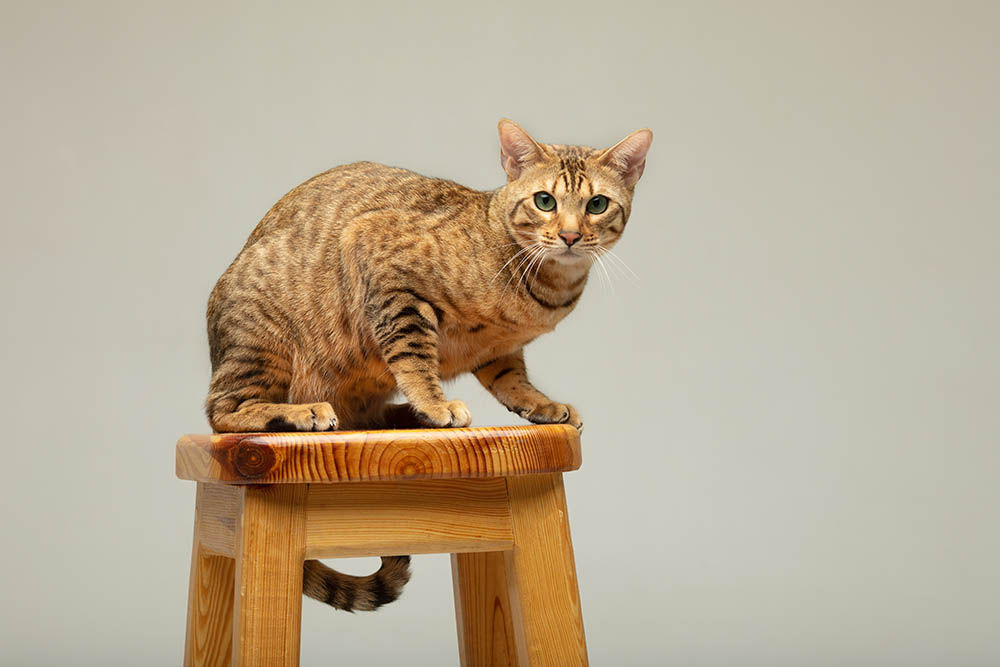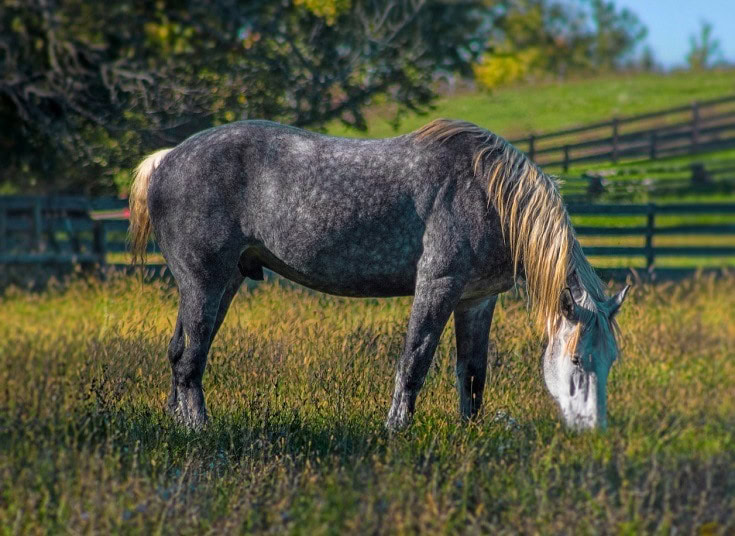Click Below to Skip Ahead
Have you always had a soft spot in your heart for wildcats and wished you could keep one as a pet? A Serengeti is one way that you can bring a domestic kitty with a wild look into your life!
Breed Overview
Height:
8–10 inches
Weight:
8–15 pounds
Lifespan:
9–15 years
Colors:
Gold, gray, brown, black, spotted
Suitable for:
Energetic families with plenty of space to play and explore
Temperament:
Energetic, gentle, playful, outgoing
This beautiful breed is a mix of the Bengal and the Oriental Shorthair, so they have a spotted coat, long legs, and large ears. Their striking appearance is only part of what makes them such a sought-after breed, however. Serengetis are also known for their high energy levels, loyalty, and agility.
Whether you just want to know more about this breed or are considering adopting one, read on as we explore the Serengeti in depth so you can decide if this beautiful feline is right for you.
Serengeti Cat Characteristics

Serengeti Cat Kittens
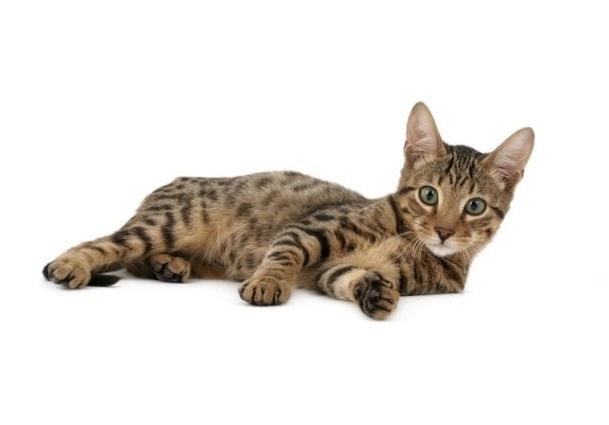
The Serengeti cat is a rare and difficult-to-find breed. In almost all cases, you will need to go through a breeder to find a kitten to adopt, and finding someone reputable can be quite the task.
When you’re in the midst of researching breeders, don’t be afraid to ask them a lot of questions. Reputable breeders will not hesitate to meet with you as many times as it takes for you to determine if a Serengeti is right for you. They should also provide health guarantees, TICA registration paperwork, and proof that the kitten is guaranteed against defects like pyruvate kinase deficiency and progressive retinal atrophy.1
Reputable breeders will not release their kittens until well after they’ve weaned. Most kittens will be ready to leave their mothers by the time they’re 14 weeks old. You mustn’t take the kitten away from their mother too early, as they need that time to socialize. Sometimes, kittens that are separated prematurely can have behavioral issues when they’re older.
You can always try to find a Serengeti at your local humane society or shelter, and you’ll be saving a cat’s life too!

Temperament & Intelligence of the Serengeti Cat
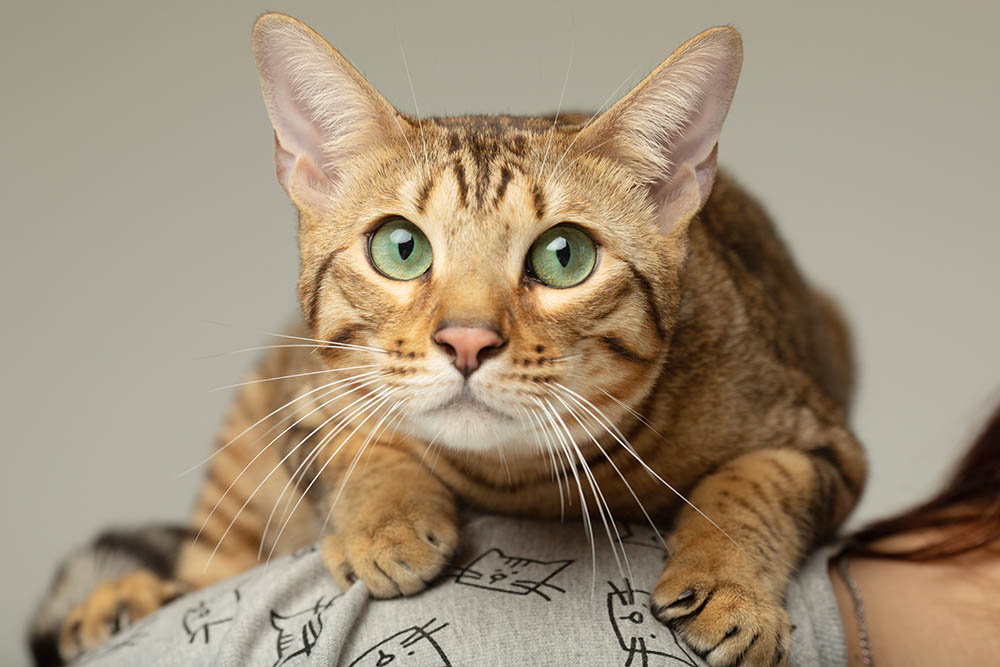
Serengetis are known for their open and self-assured temperament. Some can be shy at first, especially if they’re put into a new location or are with unfamiliar people, but the moment they warm up to their new surroundings, they will always want to be by your side. Serengeti cats form strong bonds with their humans, and you might find it difficult to tear them away from your side.
This breed does not like to be left alone. They need love, affection, and attention at all times. Although they don’t discern between a human family member and other animal housemates, you would do well to ensure that your Serengeti doesn’t spend a lot of time without human interaction. These cats can be quite vocal at times, a trait they likely stole from their Siamese lineage. They will happily chat away with you at any time of day.
Like their Oriental Shorthair ancestors, Serengeti cats have nimble little toes that are adept at opening cupboards and drawers. Don’t be surprised if your kitty eventually finds a way around the childproof locks that you’ll inevitably have to purchase! They are also great at turning on faucets and opening doors. You might need to consider changing some of your home’s door handles and faucet styles to prevent your Serengeti from getting into too much trouble.
This breed is highly intelligent and driven, so if there’s something they want, they’ll find a way to get it.
Are These Cats Good for Families? 👪
Yes, absolutely. Serengeti cats thrive on time spent with their favorite humans. They are affectionate with their family members, and their playful nature makes them great playmates for kids.
That said, you should always exercise caution when leaving your pets alone with small children. There should be adult supervision at all times to ensure that neither cat nor child gets injured.
Kids need to learn from a young age how to act in the presence of animals. Pulling their tail, yanking them around, or holding them against their will are all behaviors your Serengeti will not enjoy, so you must be a good role model.
Does This Breed Get Along With Other Pets? 🐶 😽
Yes, Serengetis are capable of getting along with other pets in the household. The key factor to ensuring that they get along is to do introductions slowly and deliberately. New cats should be kept in a separate space of your home for several weeks before you even begin the process.
When you start bringing your Serengeti into the shared spaces of your home, be sure to have an escape route that they can take if they get overwhelmed. Keep all doors open and set up cat trees so they have options for exiting the situation if it becomes too much.
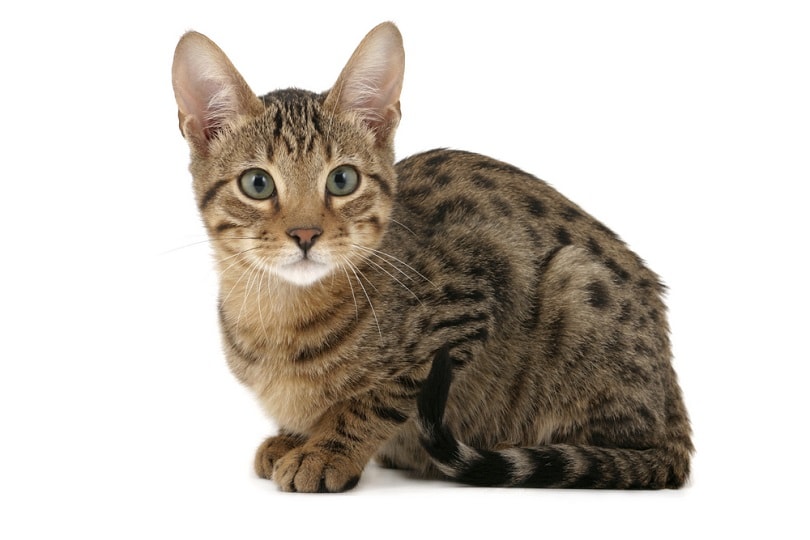

Things to Know When Owning a Serengeti Cat
Food & Diet Requirements 🐡
While Serengeti cats don’t require a specific diet based solely upon their breed, there are considerations that responsible owners should take into account as they choose the best food and diet for their pets.
You should aim to feed your cat the highest quality diet that your budget allows. Look for foods with real meat as the first few ingredients since all cats are obligate carnivores. They need nutrients that are only present in animal flesh, such as taurine.
Grains often get a bad reputation in the pet food industry, as many owners believe that their pets are allergic to them. In reality, it is more likely that a cat will be allergic to the meat in their food. Meat is the third most common allergen in felines. You might still opt for a grain-free diet for your Serengeti, but we recommend talking with your vet before doing so.
Many owners get stuck on the canned versus dry food debate. Some experts swear that wet foods are healthier, while others maintain the belief that cats can do well on both food types. While it is true that canned foods are higher in moisture, which is essential for cats that aren’t drinking enough water, dry food is great for convenience and cost. You might wish to implement a diet that contains wet and dry foods to get the best of both worlds.
A cat water fountain is a must-have for your Serengeti to help boost their hydration levels. Fountains with flowing water can encourage cats to drink, as many refuse to drink out of stagnant bowls. A fountain makes an inviting bubbling sound that will entice your kitty to drink more often.
Exercise 🐈
This breed is as energetic as you might expect from any cat that has even a minute amount of wildcat in their ancestry. They are athletic and would be happy to spend their whole day climbing to the highest point in your home.
A Serengeti needs a home that can provide them with activities to burn off some energy. You’ll need to invest in several high perches and cat trees and get used to keeping keepsakes and dangerous items far out of reach. If you think the top of your kitchen cupboards is a safe spot, think again. Your Serengeti will figure out a way to get there and then spend a considerable amount of time up there watching you and the other members of your household go about the day.
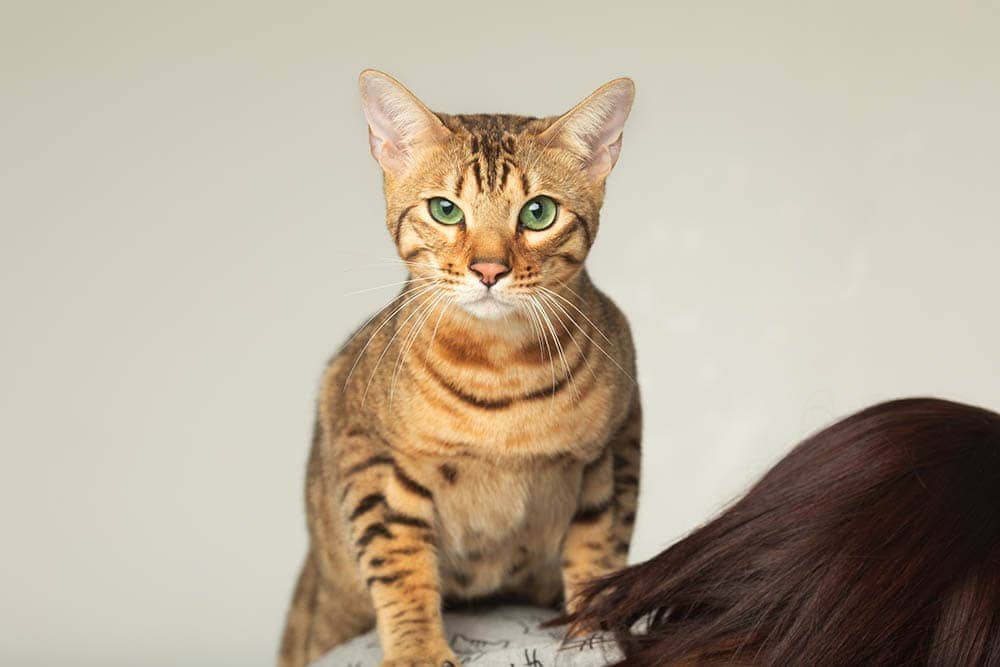
Training 🧶
Serengeti cats are known for their high intelligence levels and confident personalities. You shouldn’t find it too difficult to teach your kitty how to do basic tricks like fetch or simple commands like “come.”
Use a positive reinforcement-based training program to keep your Serengeti interested in participating in your training sessions. Offer them treats like fresh meat or commercial cat treats as rewards for a job well done.
Some Serengeti owners have great success with clicker training their cats.
Grooming ✂️
Serengeti cats require little help from their owners when it comes to grooming. Their coat is ultrashort and sleek, so we just recommend brushing them at least once a week to remove any loose hairs. This will help cut down on shedding while also reducing your Serengeti cat’s risk of hairballs.
In addition to their weekly brushings, you should trim their nails, clean their ears, and brush their teeth. These grooming tasks can be done on an as-needed basis.
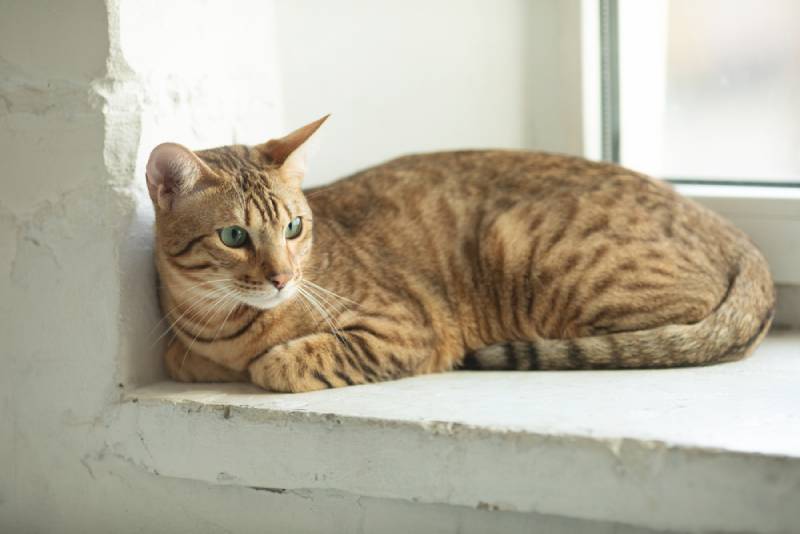
Health and Conditions 🏥
Serengeti cats are relatively healthy and aren’t at risk of any particular health conditions due solely to their breed. It might be worth looking at the typical health issues of the breeds that the Serengeti was developed from, though: the Oriental Shorthair and the Bengal.
Bengals can have hereditary issues that could be a cause for concern if they were not acquired from reputable breeders. Conditions like cataracts, hypertrophic cardiomyopathy, and progressive retinal atrophy are possible. Responsible breeders will take steps to prevent these genetic issues from forming and identifying them before adoption. Oriental Shorthairs can be prone to conditions like bladder stones, mast cell cancer, periodontal disease, and liver amyloidosis.
Remember, however, that these conditions are more commonly found in the Serengeti lineage and aren’t necessarily issues that you will run into with your cat. It’s also important to note that when you buy from a reputable breeder, they will provide proof of veterinary health checks and screenings and a health guarantee.
- Periodontal disease
- Retinal degeneration
- Hypertrophic cardiomyopathy
- Progressive retinal atrophy
- Bladder stones
Male vs. Female
As with most cat breeds, the main difference between a male and female Serengeti is size. Males are slightly larger and heavier and can weigh up to 15 pounds. Females are generally smaller and weigh between 8 and 12 pounds. The male cats generally have more rounded faces and wider cheeks due to the testosterone in their bodies. Wildcats with large cheeks denote a certain physical fitness that helps them survive in nature.
Male Serengeti cats may also urinate to mark their territory. Unneutered males are much more likely to display this behavior because of their high testosterone levels. Most instances of urine marking will be reduced by getting your cat neutered.


3 Little-Known Facts About the Serengeti Cat
1. Serengeti Cats Do Not Hail From Africa
Despite their name, Serengeti cats do not originate from Africa. This breed was actually created in California by a conservation biologist named Karen Sausman in the 1990s, whose ultimate goal was to create a breed that looked similar to a wild Serval without using actual Servals during breeding.
2. Serengetis Are Sometimes Known as “Velcro Cats”
Don’t let their wild looks fool you. The Serengeti is a highly sociable and loyal breed that thrives in the company of others. They love their humans so much that the breed earned the nickname, “Velcro cat,” because of how much they love to be by their people’s side.
3. Some Serengetis Have Melanistic Markings
Melanism is a genetic trait seen often in wild cats and simply refers to a black coat color. Many species in the Felidae family have melanistic coats, such as black-coated leopards. Even so, you are still able to see their spots in the right lighting. The same can happen with Serengeti cats. They can grow up to have “ghost spots” or stripes that are most commonly seen in animals like black jaguars.

Final Thoughts
The Serengeti cat is truly visually stunning. Their silky coat with its beautiful markings makes them highly covetable by feline lovers everywhere. But this breed has more to offer their owners than just a pretty face. The Serengeti is a personable, loyal, athletic, and playful breed that can bring a lot of joy into their owner’s life.
If you’re considering adopting a Serengeti, you must be willing to spend a great deal of time with them. They’re also known as Velcro cats, so your pet will want to be by your side every minute of every day.
You also must be willing to make your house fun and safe for their antics. Your cat can’t decipher between precious keepsakes and toys, so it’s best to keep your prized possessions far out of reach. Make sure you have plenty of cat-safe perches for your Serengeti to scale and climb upon.
If you’re willing to make a few sacrifices for your new kitty, a Serengeti might be the perfect breed for you!
Featured Image Credit: LTim, Shutterstock
